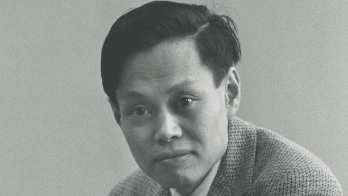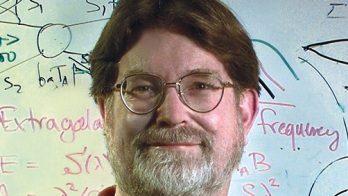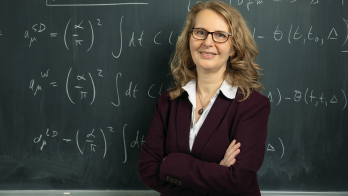During a week-long visit to CERN’s Theory Unit to discuss his current research, Stephen Hawking visited the LHC, gave a well attended general lecture and talked to CERN Courier.
Stephen Hawking is the best known physicist alive. His book A Brief History of Time was a bestseller around the world, but sometimes his star status obscures his continued activity at the frontiers of theoretical physics. For some 40 years his research has centred on theoretical cosmology and black holes. When he started work as a theoretical physicist in the 1960s, particle physics and cosmology seemed to be separate worlds, but now these topics are increasingly intertwined. So it was not surprising that Hawking should want to visit the Theory Unit at CERN, to meet fellow theorists and give a seminar on his current work.
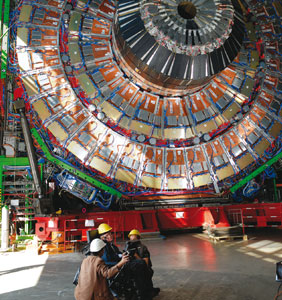
In the 1960s, Hawking and Roger Penrose developed the famous singularity theorems in general relativity, which provided a precise set of general conditions under which the existence of gravitational collapse is inevitable, leading to black holes. In particular Hawking provided a fairly complete theory of black holes and their classical properties, which led to intriguing analogies with the laws of thermodynamics. An important application of this work led to the theory that our universe began with a Big Bang, with an initial singularity.
Perhaps more famously, however, in the early 1970s Hawking shocked the world by showing that if one considered quantum mechanics (quantum field theory) in the presence of black holes, these are not black after all, but rather they emit radiation with a thermal spectrum and a temperature that depends only on the basic characteristics of the black-hole state: namely, its mass, angular momentum and charge. In the simplest case, the temperature is inversely proportional to the mass. This phenomenon is known as black-hole evaporation.
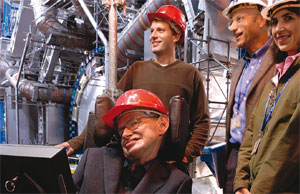
Hawking went even further, however, and made the provocative proposal that the laws of quantum mechanics must be changed in the presence of black holes. Specifically, quantum information and quantum coherence are irreversibly lost in the formation and evaporation of black holes. This proposal has generated much work in the past 30 years, and we are only now beginning to understand that quantum mechanics does not after all need to be modified. However, many aspects of the theory of quantum gravity need to be understood in detail before we can claim that the paradox has been resolved.
The Hawking evaporation phenomenon also has basic observational consequences. If a black hole has a small mass, then it will radiate more copiously, so we can put an observational limit on the size of remnant black holes from the origin of the universe. Furthermore, if CERN’s Large Hadron Collider (LHC) produces mini black holes we know that they will evaporate with a nearly thermal spectrum, an important characteristic in identifying them.
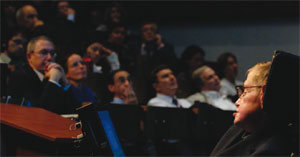
Currently Hawking is working on quantum cosmology. He is studying a top-down approach to cosmology that combines the string landscape with the scenario of no-boundary initial conditions. The theory seminar that he presented at CERN was based on this work in collaboration with Thomas Hertog, who is currently a fellow with the Theory Unit.

In his general colloquium, which attracted an audience of 850, Hawking discussed one of his favourite topics – the origin of the universe. He argued that thanks to what we have learned over the past 100 years we may finally have a scientific way to address this subject. General relativity predicts that the universe, and time itself, would have begun in a Big Bang. It also predicts that time ends in black holes. The discoveries of the cosmic microwave background radiation and of black holes support these conclusions; adding in quantum mechanics begins to yield the rudiments of a theory of structure in the observed universe. However, much still remains to be understood on this subject, although as Hawking argued in his seminar, a scientific cosmogony is both possible and within reach of theoretical and experimental work.
During his stay at CERN, Hawking also visited the ATLAS and CMS experiments, as well as the tunnel of the LHC, where installation work proceeds rapidly. He was interested in the details of the experiments, and in the possible discovery of mini black holes. He also met with the director-general, Robert Aymar, and their discussion covered topics ranging from open-access publishing to the start-up of the LHC. Congratulating Aymar and the CERN community on their scientific work, he commented “You have an exciting two years ahead of you.”






